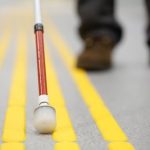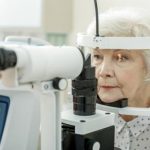 February is Low Vision Awareness Month, so we are rounding up our relevant topics. You can read about low vision in elderly, how to improve your quality of life, AMD lifestyle changes, AMD home remedies, and an AMD diet.
February is Low Vision Awareness Month, so we are rounding up our relevant topics. You can read about low vision in elderly, how to improve your quality of life, AMD lifestyle changes, AMD home remedies, and an AMD diet.
AMD refers to age-related macular degeneration. In simpler words, it refers to eye problems caused due to degeneration in old age resulting in low vision. It’s estimated that three million Americans suffer from low vision, a condition where people find it difficult to see despite having glasses and medical or surgical treatment. Most of these people are over the age of 65.
Advertisement
In order to lead a better quality of life, people with low vision are advised to seek medical help and follow a lifestyle and diet that helps them to maintain their existing vision.
Doctors also recommend a vision rehabilitation program to help patients with poor vision cope with the problem and lead a near-normal life. A healthcare provider or community professional can help you access this.
To learn more about low vision and AMD, you can read the following articles:
Low vision in elderly: Causes, symptoms, and treatment
Low vision in the elderly is a common problem, as our eyes undergo different changes over time. For the most part, many vision problems can be corrected with glasses or contact lenses, but if these can’t help, then surgery may be required. When corrections have been made to your vision and it still isn’t 20/20, this is known as low vision.
Low vision is when a person uses corrective devices or has undergone surgery to correct their vision and yet still reports difficulties performing daily tasks such as reading the mail or signing their name.
Those over the age of 65 are at the highest risk for low vision, and the risk is higher among individuals with diabetes or glaucoma.
Types of low vision include loss of central vision, loss of peripheral vision, night blindness, blurred vision, and hazy vision. Continue reading…
 Three technologies improving quality of life for those with low vision, blindness
Three technologies improving quality of life for those with low vision, blindness
February is National Low Vision Awareness Month, and the National Eye Institute is outlining five new technologies currently in development to make life for those with low vision or blindness easier.
Low vision is characterized by difficulty performing daily tasks even after receiving treatment in the form of glasses or contacts, medications, or surgery. The type of vision loss can vary based on the cause and can affect different aspects of an individual’s life.
For example, the loss of peripheral vision may be due to glaucoma and can impact your ability to walk and drive, while central vision loss can occur because of age-related macular degeneration and make tasks like reading difficult. To help those living with low vision and blindness, researchers are currently developing technologies that can be used to make some of these tasks easier. Continue reading to learn more about these new innovations. Continue reading…
How do eye doctors recommend lifestyle changes to their AMD patients?
Age-related macular degeneration (AMD) is the leading cause of permanent blindness in Americans, and it occurs as a result of aging. There aren’t any specific treatments or cures for AMD, but many optometrists and ophthalmologists will recommend their patients adhere to healthy lifestyle habits as a means to keeping their eyes healthy and slowing down the progression of AMD.
Researchers surveyed eye doctors to rate the strength of evidence for nutritional supplements in the prevention and treatment of AMD. Furthermore, eye doctors were asked about their sources of information regarding the benefits of these supplements to vision.
The cross-sectional study looked at four main areas: use of nutritional supplements, dietary advice, smoking and eye diseases, and strength of evidence and the sources of information regarding nutritional supplement interventions. Continue reading…

Home remedies to reverse age-related macular degeneration naturally
Age-related macular degeneration (AMD) is a common vision problem affecting people over the age of 40. The macula starts deteriorating over time, affecting one’s vision. You may find that you now need glasses, or that you have to hold text further or closer away from the eyes in order to see it.
AMD is the leading cause of vision loss in America, and the numbers are expected to rise as the population continues to age. The number of AMD cases is expected to hit 5.44 million by 2050.
There are two types of AMD: dry and wet. Dry AMD is a gradual vision loss as a result of thinning macular tissue. It is characterized by the present of yellow deposits, known as drusen, in the macula. Wet AMD is far worse than dry AMD. Wet macular degeneration takes place when abnormal blood vessels leak fluid or blood into the macula. As a result, patients may see spots in the center of their field of vision or they may notice that straight lines appear wavy since the macula isn’t smooth anymore. It is also worth noting that dry macular degeneration can progress into wet macular degeneration. Continue reading…
 Age-related macular degeneration risk may be reduced with the Mediterranean diet and caffeine: New study
Age-related macular degeneration risk may be reduced with the Mediterranean diet and caffeine: New study
Age-related macular degeneration risk may be reduced with the Mediterranean diet and caffeine. The latest findings found that age-related macular degeneration (AMD) risk was lower among those who ate a Mediterranean diet, especially eating lots of fruits. This is the first study to show the protective effects of caffeine against AMD.
Numerous studies have revealed the benefits of the Mediterranean diet in supporting a healthy heart and brain. The researchers then took it a step further to see how the Mediterranean diet may impact the development of AMD among a group of Portuguese people.
Advertisement
The researchers studied 883 individuals over the age of 55, of which 449 had early AMD and 434 did not have AMD. Diets were assessed using questionnaires asking how often they ate foods that are part of the Mediterranean diet. The researchers found the more frequently participants ate the
Mediterranean diet foods the lower their risk of AMD was. Fruits were also seen highly beneficial in maintaining vision and preventing AMD, along with caffeine and antioxidant consumption.
Caffeine is not considered a part of the Mediterranean diet, but caffeinated beverages and food are often consumed in Mediterranean countries. Continue reading…

